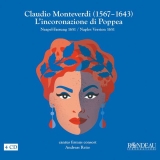Im Sommer 2021, kurz ehe er in Leipzig sein Amt als Thomaskantor antrat, dirigierte der Schweizer Andreas Reize auf Schloss Waldegg in der Nähe von Solothurn Monteverdis L’Incoronazione di Poppea in einer anhand der Urfassung erarbeiteten eigenen Fassung, die Reize auf Basis von Clifford Barletts Edition und mit Hilfe des Manuskripts der Neapel-Aufführung zusammengestellt hat. Im Booklet weist der Dirigent auf die riesigen Unterschiede zwischen den Fassungen aus Venedig und Neapel hin. Und für diese Fassung, die hier erstmals in voller Länge erklingt, musste er viele musikalische und künstlerische Entscheidungen treffen.
Bei der Besetzung verzichtet er auf Blechinstrumente und zieht neben Streichern, Zupfinstrumenten, Orgel und Cembalo nur zwei Blockflöten heran.
Die Sopranistin Pia Davila singt die Poppea, und die Mezzosopranistin Elvira Bill den Nerone. Das verwirrt etwas, weil Bill eigentlich nicht besonders männlich klingt. Aber weil die Stimmen charakteristisch sind, gewöhnt man sich daran. Auch die übrigen Solisten sind exzellent.
Vor allem aber gefällt diese Interpretation, weil sie dramatischer und theatralischer ist als andere, deren Konzeption eher in Richtung Oratorium tendiert. L’Incoronazione di Poppea (Die Krönung der Poppea) erzählt von der ehebrecherischen Liebe zwischen Nero und Poppea, aber die Oper betont auch die Intrigen im dekadenten Rom und das tragische Schicksal von Ottone, der Poppea vor Nero liebte, und Ottavia, dessen Frau, die von Nero ins Exil geschickt wurde, um damit den Weg für die Incoronazione frei zu machen.
Reize lässt sein Orchester äußerst dynamisch agieren und somit den Hintergrund bilden, vor dem die sehr engagierten Sänger die Gelegenheit haben, ihrer Leidenschaft in den Hymnen der Liebe ebenso wie in denen des Schmerzes freien Lauf zu lassen. Das tun alle sehr unmittelbar in diesem musikalischen Abbild der Krise in einem korrupten, unehrlichen Rom, in dem Denunziation und Angst die wahre Liebe vertrieben haben.
In the summer of 2021, shortly before he took up his post as Thomaskantor in Leipzig, the Swiss Andreas Reize conducted Monteverdi’s L’Incoronazione di Poppea at Schloss Waldegg near Solothurn in his own version, which Reize compiled on the basis of Clifford Barlett’s edition and with the help of the manuscript of the Naples performance. In the booklet, the conductor points out the huge differences between the Venice and Naples versions. And for this version, heard here in full for the first time, he had to make many musical and artistic decisions.
In the performance, he dispenses with brass instruments and enlists only two recorders in addition to strings, plucked instruments, organ and harpsichord.
Soprano Pia Davila sings Poppea, and mezzo-soprano Elvira Bill Nerone. This is somewhat confusing because Bill doesn’t actually sound particularly masculine. But because the voices are distinctive, one gets used to it. The other soloists are also excellent.
Above all, this interpretation pleases because it is more dramatic and theatrical than others whose conception tends more toward oratorio. L’Incoronazione di Poppea (The Coronation of Poppea) tells of the adulterous love between Nero and Poppea, but the opera also emphasizes the intrigues in decadent Rome and the tragic fate of Ottone, who loved Poppea before Nero, and Ottavia, his wife, who was exiled by Nero, thus clearing the way for the Incoronazione.
Reize allows his orchestra to perform extremely dynamically, so forming the background against which the very committed singers have the opportunity to give free rein to their passion in the hymns of love as well as in those of pain. They all do so very grippingly in this musical reflection of the crisis in a corrupt, dishonest Rome where denunciation and fear have driven out true love.
Thomaskantor Andreas Reize: « Ich bin ein Dirigent, der Herausforderungen sucht »
























